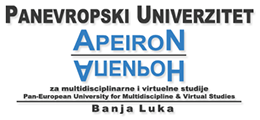 Impact of the Technological Purification Process on the Drinking Water Quality in the Water Supply System of Banja Luka
Impact of the Technological Purification Process on the Drinking Water Quality in the Water Supply System of Banja Luka
Impact of the Technological Purification Process on the Drinking Water Quality in the Water Supply System of Banja Luka
Danijela Babić1,2, Gojko Bunčić2
1Public Health Institute of the Republic of Srpska, Banja Luka, Bosnia and Herzegovina; danijela.babic@phi.rs.ba
2Pan-European University “APEIRON”, Banja Luka, Republic of Srpska, Bosnia and Herzegovina
ABSTRACT: This paper analyzes the impact of the technological purification process on the drinking water quality in the water supply system of the City of Banja Luka. Microbiological and physico-chemical parameters of raw water samples from the River Vrbas and purified water samples from reservoirs collected during three time periods: 1977, 2006 and 2025 were used. The research has showed a significant microbiological load of raw water, especially the presence of coliform bacteria and enterococci, which indicates fecal contamination of the source. Despite this, the analysis of the results has determined that the water conditioning process, which includes ozonation, filtration and chlorine disinfection, successfully eliminates contaminants and ensures the microbiological and physicochemical safety of drinking water. The results confirm that the purified water meets the requirements of the Regulation on the health safety of drinking water across analyzed years. Based on these findings, the need for continuous monitoring of raw water quality and technical improvement of treatment plants is emphasized in order to ensure the long-term safety of the water supply.
Keywords: drinking water, conditioning, microbiological analysis, physicochemical parameters, water supply of Banja Luka and the River Vrbas.
| Attachment | Size |
|---|---|
| Pages from QOL-Volumen 16_Issue 3-4 JUL 2025-WEB-5.pdf | 445.28 KB |
